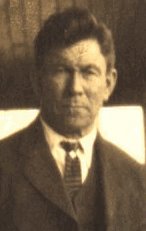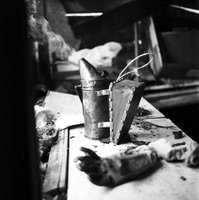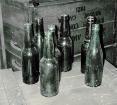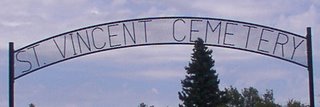Dick Lapp's Reminiscences
of the U.S. Customs Service
by Don Keller

Prohibition was the name of the game when Dick Lapp entered the Customs Service in 1928. It was the era of John Dillinger, flappers, booze, speakeasies and
Silent Cal. It was probably one of the most exciting times to be in the Customs Service. The Immigration Service, plus the Border Patrol and the Customs Service with the Customs Patrol, formed a very thin screen between Canada, with an unending supply of liquor, and a thirsty American public.
A smuggler awaiting arraignment told Dick that he was crazy to work for the Customs. He told him that he could make $2000 to $3000 a week running booze from Winnipeg to Minneapolis. He said that a single load of thirty cases meant a thousand dollars profit.
One winter evening a Border Patrolman became curious about the driver of a Ford coupe in Pembina. The patrolman had been on his way to pick up his partner at the bank corner and together they were scheduled to check the northbound NP passenger train. The driver of the Ford coupe cooperated beautifully as he drove past the bank. He evidently realized that he was being followed as he accelerated considerably going across the bridge. The Border Patrolman stopped to pick up his partner and they took up pursuit. As they cleared the Red River bridge
[NOTE: By now, they must be in St. Vincent as I read it ] they saw taillights turn off the highway on the road leading to the school. About a block north of the highway they came upon the abandoned car. A quick search of the neighborhood failed to turn up the driver. They called for reinforcements and the area to the north was thoroughly searched, as they felt he would make an attempt to get across the border. The search was in vain, but when they got the car back to the barracks they emptied it of 711 bottles of whiskey. The next morning they returned to the scene of the abandonment and discovered the driver's tracks leading to an overturned water storage tank. Lifting up the tank they estimated from the amount of cigarette butts, that the driver had spent most of the night inside.
In 1928, the customs office at Noyes did not open for car traffic until 9:00am. By that time during the summer, cars were lined up back to where the Canadian office is now located. The Canadian office was in the post office building in Emerson. The Noyes office was located in the present Great Northern and Soo Line Depot and the highway ran alongside the Great Northern tracks.
During Mr. Lapp's first summer of work as an inspector at Noyes, they had orders to go through every car thoroughly for undeclared and prohibited items, particularly liquor. The Great Northern kept one steam engine stationed at Noyes. Mr. Lapp remembers how on hot afternoons the crew enjoyed backing their engine to the section of track nearest the inspection area. Between the hot afternoon sun and the panting steam engine both trying to outdo each other in the release of heat, and the mounting irritation of the auto's occupants, it was a very warm occupation.
One day they received a call at Noyes that a young man, his wife and baby had just checked out of a hotel in St. Norbert. They were U.S. residents and the hotel keeper suspected they would be heading to the United States. When the man had paid his bill, she placed the money in the safe but before she locked it she was called to another room. When she returned, the man, fifty-four dollars in currency, and a lady's #75.00 wristwatch had departed. She gave a good description of the car and its occupants and in due time they arrived.
Mr. Lapp had been called from Pembina to assist in the search as nothing had been discovered the first time through. When Dick arrived he noticed that the young man exhibited extreme nervousness. After searching the upholstery for a small tear where the money and watch could be secreted, Dick asked the other inspector if he had looked under the floor mat. Before the inspector could reply, the young man jerked out a pack of cigarettes. In his haste to take out one, the watch came flying out. Then lifting the floor mat the fifty-four dollars was discovered.
On day a letter came to Noyes from a disgruntled gentleman in Winnipeg. He said that he was sick and tired of listening to four young men, with whom he worked, brag about smuggling four, forty-ounce bottles of whiskey into the United States each weekend, which they would sell for twenty dollars apiece on their arrival at Detroit Lakes, Minnesota. Their profit covered all of their expenses for the entire weekend. The gentleman did not know where they secreted the whiskey but he gave a good description of the car.
The next Saturday morning the four young men, all well dressed and nicely groomed, arrived in the described car. A reasonably thorough search disclosed no liquor. One of the older inspectors suggested they take the car over to the gas station and put it over the grease pit. (For you younger readers, gas stations were not equipped with hydraulic hoists in those days.) The older inspector, having several years of seniority and being rather rastidious, suggested that Dick get down in the pit. Dick looked it over from stem to stern but noticed nothing amiss. He did happen to remark, however, that he did not know that Fords had two mufflers. The other inspector said they didn't and brought a hammer to Dick and told him to tap them. The first "muffler" he tapped gave off not metallic clang whatsoever. It turned out to be an innertube and with the four forty-ounce bottles inside, it closely resembled the other muffler. After paying the five dollar penalty for each bottle, the young men declined the opportunity to continue their trip to Detroit Lakes and returned to Winnipeg.
Most of the information received by customs was good, but sometimes it went awry. One day they received a tip that a quantity of liquor would be coming through the border in a blue Cadillac. The car was described in detail. The inspectors were given specific instructions that if the Cadillac showed they were not to let it go until they had located the whiskey.
In short times a blue Cadillac appeared, driven by a dapper man in his late forties. A thorough search of the car revealed no liquor. One of the inspectors went into the customs office and secured two long hatpins. With these in hand, they began probing the backs of the fronts and rear seats. The driver who had told them repeatedly that he had no liquor, now became irate. Undaunted, the two inspectors continued their probing to no avail. One finally remarked to the other, "We've looked everywhere. It's gotta be in the tires." Beginning with the spare they let the air out of all the tires. Still no whiskey. They had neglected to move the tar over to the gas station near the air hose and the driver lost his composure completely. He told them they "bloody well better" blow up his tires and that he would see someone about getting them fired. About fifteen minutes after the two perspiring inspectors succeeded in blowing up the tires with hand pumps and had given the gentleman permission to proceed, an identical blue Cadillac showed up, complete with the whiskey.
Several years before Mr. Lapp joined the Customs he was employed by a customs broker. He happened to be at Noyes one evening when three special trains, two on the Soo Line and one on the Great northern, arrived. They continued members of an organization which shall remain nameless. They had been attending a convention in Winnipeg and evidently the huge majority sought to lay up an entire year's supply of liquor. Customs had barely started their inspection when it became apparent they would have difficulty carrying off all the whiskey. So they requisitioned a quantity of pillow slips from the sleeper cars and it was soon necessary to recruit members of the train crew and the section crew to help carrying it off.
One of Dick's co-workers at the brokerage house was watching the fun with him. Suddenly he remarked, "You know, Dick, all of that liquor is not going into the customs office." As they watched, they noted some of the rail crew helping to carrying it off, slipping into a passageway through the depot leading to the Soo Line tracks. Dick's co-worker disappeared for a short time and he came back with a self-satisfied smile. He had moved some of the liquor from the crew's hiding place to a hiding place of his own.
The penalty for attempting to smuggle a bottle of liquor into the United States was five dollars a bottle regardless of the size of the bottle. On smuggler learned this to his dismay. He had removed all the lining fabric from a Model "A" coupe. He then carefully packed three miniature (two ounce bottles) into the exposed space and then replaced the fabric. His fine amounted to fifteen hundred dollars. The gas station operator at Noyes cashed his check after Customs refused to accept it and the would be smuggler went on his way a sadder but a wise man.















